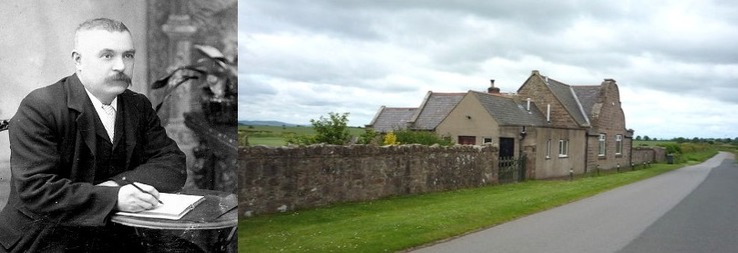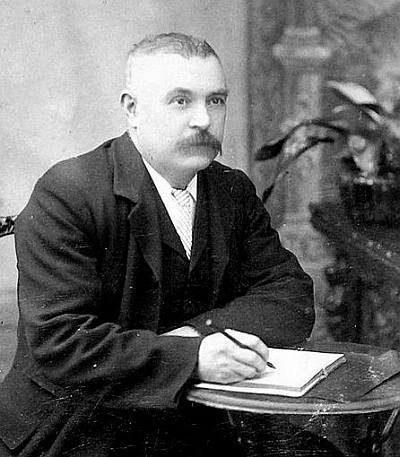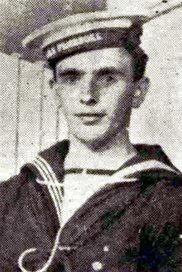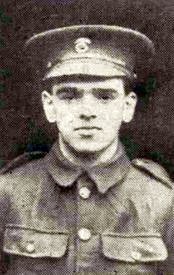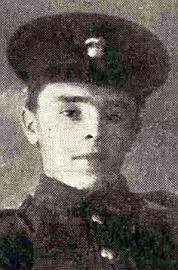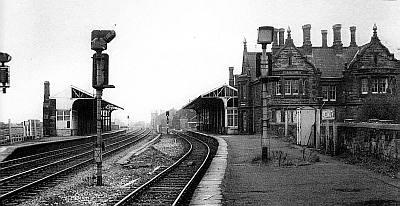
Photograph of Tweedmouth Station taken in the early part of the 20th century. The Railway Hotel can be seen to the right in the foreground. Thomas Grey would have driven locomotives through the station on numerous occasions. © John Burgon.
Thomas Grey, the son of a miner, was born on 16th September 1863 at Shoreswood, a small hamlet just over 6 miles west of Berwick-upon-Tweed. In the first quarter of the twentieth century Thomas’s poems, numbering hundreds, were regularly published in the Berwick Advertiser. He contributed to The Wheatsheaf, the official magazine of the Co-operative movement. His poems also featured in the Railway Magazine. In 1916 he was elected as a Fellow of the International Institute of British Poetry. That same year at the request of the Royal Normal College in London (now known as The Royal National College for the Blind) he sent 200 copies of his poems which were then printed in braille.
Thomas Grey was employed with the North Eastern Railway as an engine driver. During his time working on the footplate he was able to view all the seasons in the countryside, giving him inspiration for his poems. In 1906 his one and only book publication, Musings on the Footplate, was published. In World War One he composed numerous poems relating to the effects of the war on those fighting, and on mankind in general. Thomas Grey was also a well-known and highly respected figure who served the community in Tweedmouth.
Thomas Grey died on 14th August 1928, aged 64.
A full appraisal of Thomas Grey’s life can be found in the obituary below, which appeared in the Berwick Advertiser on 16th August 1928.
|
TWEEDSIDE POET DIES Mr Thomas Grey Widespread regret will be expressed at the death, on Tuesday morning, of Mr Thomas Grey, Church Road, Tweedmouth, so well-known on Tweedside and further afield for his poetry, which for many years has appeared periodically in “The Advertiser”. Though Mr Grey has been more or less an invalid for 21 years, during the greater part of which time he has been confined to bed, his active and alert brain has been used continuously for the furtherance of anything to benefit Tweedmouth. He has kept in touch with all that has went on, and has taken, when able, a leading part in many of the activities that concerned the welfare of Tweedmouth. For a long number of years he has acted as correspondent of “The Advertiser”, the Tweedmouth notes coming from his pen, though perhaps he was only known to the reading public through his many poems published from time to time, and which bore the familiar signature “Thomas Grey”.
It is just three years ago since Mr Grey had a serious illness which necessitated going to Edinburgh Infirmary, an Illness which aggravated his old-standing trouble of rheumatic pains, and which left him weaker. He has never quite regained his strength, and though able to go about a little, has for over a year been practically confined to his house, and nearly always to bed. He took a turn for the worse on Sunday, 5th August, and though he appeared to rally for a time, he got gradually weaker and became unconscious on Monday, passing away quite peacefully on Tuesday at 7.30 a.m. Had he lived another fortnight he would have been 65 years of age.
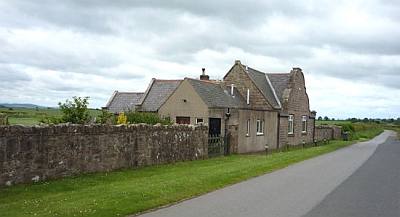 The Old School House, Shoreswood. Shoreswood National School was built c.1836 for seventy pupils. It closed in 1962 and the seventeen pupils were transferred to a new county primary school at Horncliffe. Photo © Copyright JThomas (cc-by-sa/2.0). Born at Shoreswood, Mr Grey received his education in the school there under Mr John Logan, a Berwick man and brother of the late Ald. Adam Logan, a former Mayor of Berwick. He entered the service of the North Eastern Railway, and had risen to an engine-driver when his illness overtook him as a young man in his early forties. He had to give up work, his illness rendering him unfit for his old active life. Those were the days before National Health Insurance, and with a wife and a young family Mr Grey was faced with a dark future, the problem being to rear and maintain his family. No more devoted wife could be found that Mrs Grey, who shouldered the duty nobly of nursing her invalid husband in addition to looking after her family, of whom there were nine. How she managed it perhaps she herself could not say, but she just went on from day to day. Shortly after her husband took ill they lost one of their little boys, who had been an invalid for about four years. This has been the only break in the family, and the other eight – three sons and five daughters – have done well in the world. The three sons all served In the War, James the Navy, Arthur with the Cycling Corps, and Thomas with the Machine Gun Section of the 7th N.F.’s. He attained the rank of Sergeant, and was on the eve of returning to this country in 1918 to take a commission when he was taken prisoner. A few years ago he went out to Rhodesia to take up an appointment on the railway out there and is getting on very well indeed. He was home about three years ago. The other sons are in this country, Arthur at Tweedmouth and James at Yarmouth. Three of the daughters are married, one at Yarmouth, one at Edinburgh, and one at Portobello.
His Poems
In 1906 Mr Grey published a little book of some 50 of his poems, the volume being entitled “Musings on the Footplate.” They were not on railway subjects as the title may suggest, but very many of them took form on the footplate in quiet moments when he was engaged as an engine-driver and viewed Nature in her different aspects and moods. It was always a matter of regret to Mr Grey that another volume his poems has never been published. The project has often been talked over and publishers approached, but the cost of the undertaking was always more than he could face. He must have written hundreds of poems, and on every imaginable subject. When any event interested him, when any little kindness touched his heart, or when he felt that any injustice had been done to others he always expressed his thoughts in verse. His poetry was known in every home on Tweedside. He wrote of the simple lives, the pleasures and sorrows of the working people and by his poems glorified their lives and cheered them on. From his room in Church Road he spoke through his poems to thousands of readers, giving to them something of the cheerfulness and courage with which he himself faced the difficulties of life and overcame them. He had many friends who visited him from time to time for a chat and friendly advice, and the influence he wielded was always for the best. In 1916 his work received recognition when he was honoured with being made a Fellow of the International Institute of British Poetry. In November of 1916 some of Mr Grey’s poems were printed Braille type for use of the blind, and he was thus able to bring interest and sunshine into the lives of those afflicted.
In addition to his poems, Mr Grey also wrote articles on various subjects, many of which appeared in “The Advertiser” and others in the Railway Magazine.
Work for Tweedmouth
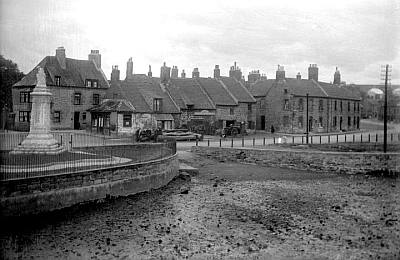 Photograph of the Tweedmouth War Memorial taken in the early 1900s, with the West End in the background prior to the completion of the Royal Tweed Bridge in 1928. A scene of Tweedmouth which would have been very familiar to Thomas Grey. Photo: source unknown. September, 1918, Mr Grey was appointed sub-postmaster at Tweedmouth, but his health did not allow him to carry out the duties long. He has acted as Chairman of the Tweedside Co-operative Society, was for many years honorary secretary of Tweedmouth Ratepayers’ Association, an active body which has done much to further the welfare of Tweedmouth. Mr Grey was forced to resign owing to ill health. He gave ungrudging and noble service in the movement to commemorate Tweedmouth’s fallen in the Great War, and to his faithful discharge of duties of secretary in a great measure is due the beautiful war memorial which stands at the end of the Old Bridge and on which those commemorated were honoured by His Royal Highness the Prince of Wales placing a wreath there on 16th May when he opened the Royal Tweed Bridge.
Mr Grey delighted in the honour paid in recent years to the memory John Mackay Wilson, the author of “The Tales of the Borders,” and last year, on the anniversary of the birthday of that author, was one of the little band of admirers who joined in the simple ceremony of laying a wreath on the grave in Tweedmouth Churchyard, which lies just opposite Mr Grey’s house.
Mr Grey for many years served on the committee of the Old People’s Supper, and was a regular attender at the annual gatherings at Christmas time, qualifying in later years for an invitation as one of the “old folks”. He also took a keen interest in arrangements for the Tweedmouth Feast Regatta, serving on the committee for many years, though in recent years he has taken no active part. The funeral takes place on Saturday.
|
**********************
Below is a report of the Grey brothers’ service in WW1, which appeared in the Berwickshire News on 14th September 1915.
Patriotic Tweedmouth Brothers
We give photos of three sons of Mr Thomas Grey, Tweedmouth, formerly an engine-driver on the N.E.R., who are serving their country. Mr Grey is a well-known local poet, and his verses which have appeared in our columns since the War are inspired by the same patriotic spirit as has prompted his sons to offer themselves for active service.
|
|
|
|
(i) Seaman James Grey, the eldest son, is in the RNR. He was engaged as a Postman before enlisting.
(ii) Arthur, the second son, is in a Cycle Corps drawn from Northumberland, Durham, and Yorkshire, and is attached to the Northumbrian Division. He was injured in the trenches by falling sandbags some two months ago, but is again fit for active duty.
(iii) Thomas Henry, the youngest son, is a Range-finder in a Machine Gun Section of the 7th Northumberland Fusiliers, and has already, since going out to France, seen four of his closest chums fall.
Photos © The Berwickshire News, September 14, 1915.
**********************
A Thomas Grey poem
While Thomas Grey was a serious poet, he also had a whimsical side to his character, as this poem shows, from the Berwick Advertiser, 19th August 1926.
|
A FISHING ADVENTURE
I wandered forth at eventide One night not long ago To feel the breeze on fair Tweedside And see the sunshine glow; My fish creel hung upon my back, The rod was in my hand; Of well-dressed hooks there was no lack For trout that I would land.
The glowing sun lay in the west Like some great ball of fire. And ‘gainst the skyline looked her best– The sight I did admire. Just then I reached a favoured spot Where expert anglers go; ‘Twas there I heard the blackbird’s note Trill on the breezes low.
I fixed my rod and tackle up With flies I thought the best, And from a “pot” just took a sup To warm my heaving chest; For I was sure of plenty fun Before the night was spent, And round my noisy reel did run And out my “cast” I sent.
Soon I did feel a ready bite, And watched my rod bend low As that great fish put up a fight While I swung to and fro. I ran him up and down awhile, And then the tackle broke– I think it was a crocodile– But just then I awoke!
|
| THOMAS GREY, Tweedmouth. |
Sources:
The Berwickshire News, September 14, 1915.
The Berwick Advertiser, August 19, 1926.
The Berwick Advertiser, August 16, 1928.
The National Archives.

